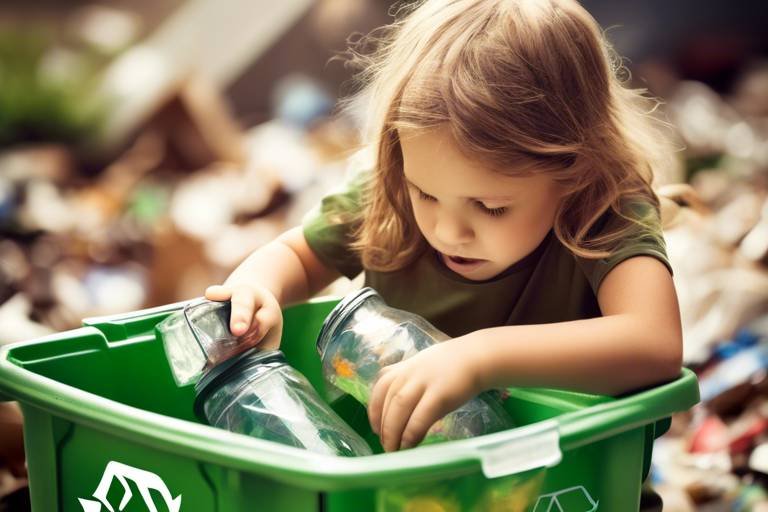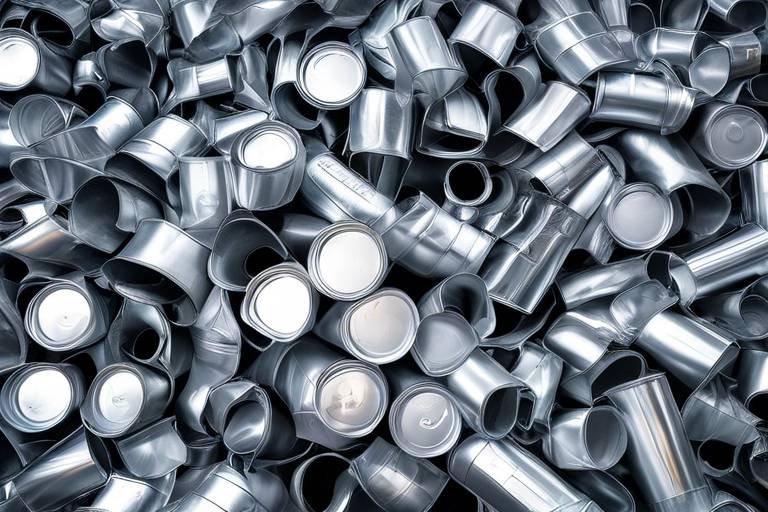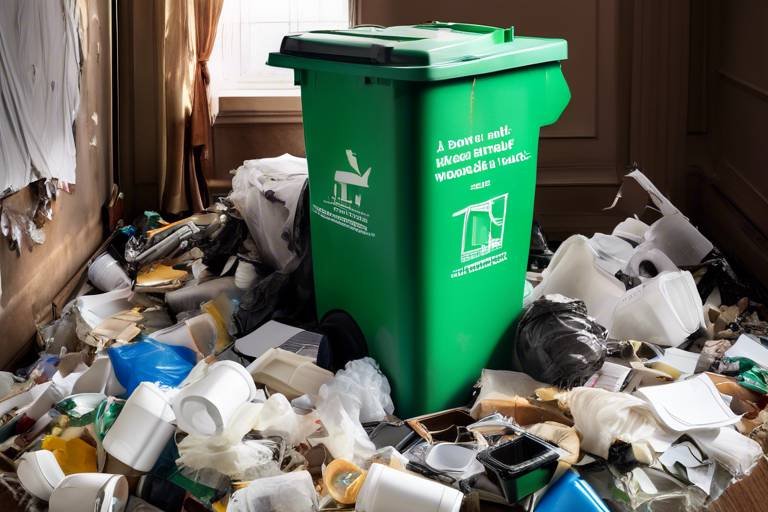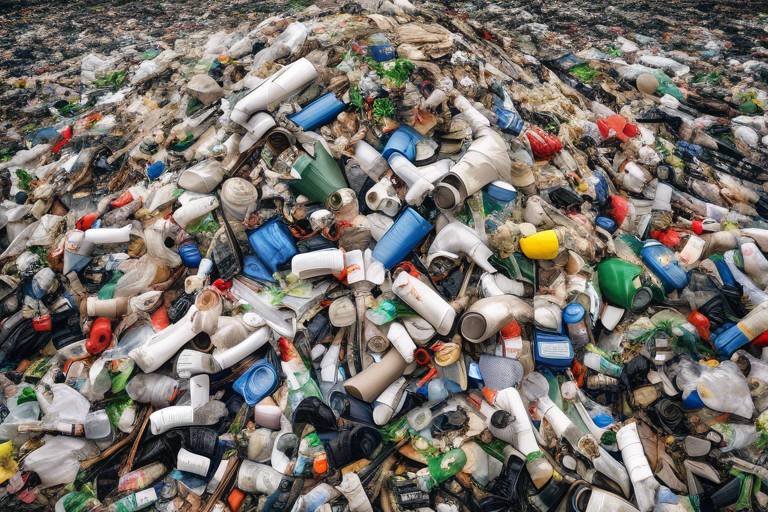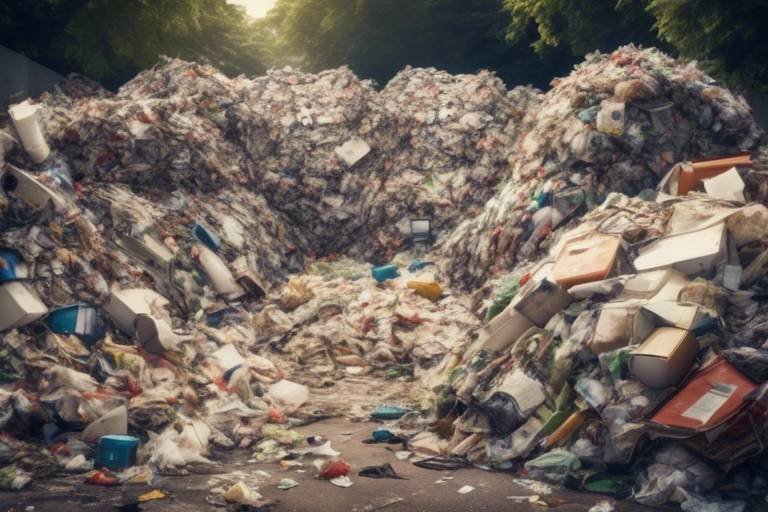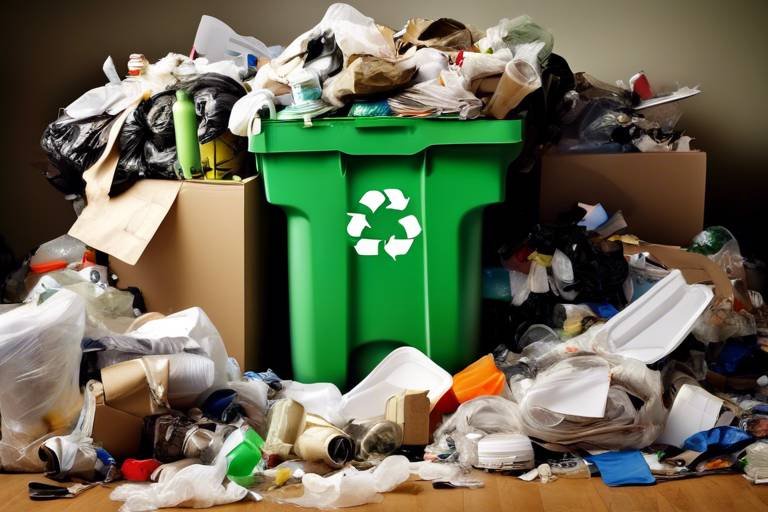Reasons to Support Bottle Deposit Scheme
The world we live in today is facing an escalating environmental crisis, and it’s becoming increasingly clear that we need to take action. One of the most effective and sustainable solutions to combat this issue is the implementation of a bottle deposit scheme. This initiative not only promotes recycling but also engages communities, boosts local economies, and encourages responsible waste disposal. So, why should we support such schemes? Let's dive into the various benefits that make them a crucial component of our environmental strategy.
First and foremost, a bottle deposit scheme significantly reduces litter and promotes recycling, leading to a cleaner environment. Imagine walking through a park or along a beach without the sight of discarded bottles and cans littering the landscape. By incentivizing individuals to return their bottles for a refund, these programs effectively decrease the amount of waste that ends up in landfills and our natural surroundings. Moreover, less litter means lower pollution levels, which helps to conserve our precious natural resources. When bottles are recycled, they can be transformed into new products, thereby reducing the need for raw materials and the energy required to produce them. It’s a win-win situation for both the planet and our communities.
Implementing a bottle deposit scheme can also boost local economies in several ways. For starters, it creates jobs in the recycling and waste management sectors. Think about it: when more bottles are collected, processed, and distributed, there’s a growing need for workers in these areas. This leads to job creation and economic growth, which can be particularly beneficial for communities that may be struggling. Not only does this initiative provide employment opportunities, but it also supports local businesses. Increased foot traffic from individuals returning bottles can lead to higher sales for nearby shops and cafes, creating a vibrant local economy.
The introduction of a bottle deposit scheme can lead to job creation across various sectors, including collection, processing, and distribution. For example, recycling centers will need more employees to handle the influx of returned bottles, while logistics companies may require additional staff to manage transportation. This ripple effect can significantly enhance job opportunities in communities, making the bottle deposit scheme not just an environmental initiative but also an economic one.
As the demand for recycled materials increases, a bottle deposit scheme can stimulate growth in the recycling industry. This initiative encourages businesses to invest in recycling technologies and infrastructure, leading to a more robust recycling market. Over time, this can create a circular economy where materials are reused and repurposed, reducing our reliance on virgin resources. The benefits extend beyond environmental impacts; they also foster innovation and sustainability within the industry.
Local businesses can greatly benefit from increased foot traffic and customer engagement through bottle deposit programs. When people come to return their bottles, they often stop by local shops, cafes, and restaurants. This not only boosts sales for these businesses but also fosters a sense of community as residents interact with one another and support local entrepreneurs. It’s a beautiful cycle of support that strengthens the local economy.
Bottle deposit schemes encourage community participation in sustainability efforts. When residents are involved in returning bottles and cans, they feel a sense of responsibility and collective action. This initiative fosters a community spirit, as people come together to contribute to a cleaner and greener environment. It’s not just about returning bottles; it’s about creating a culture of sustainability where everyone plays a role in protecting our planet.
One of the most significant impacts of a bottle deposit scheme is its ability to drive positive behavioral changes regarding waste disposal. Financial incentives encourage individuals to recycle more consistently. When people know they can get money back for returning their bottles, they are more likely to make the effort. This simple act of returning a bottle can lead to a significant increase in recycling rates, which is vital for reducing waste and conserving resources.
Statistical data demonstrates the effectiveness of bottle deposit programs in enhancing recycling behaviors. In regions where these schemes are implemented, recycling rates can soar to as high as 90%, compared to areas without such initiatives, where rates may linger around 30% or less. This stark contrast highlights the importance of financial incentives in motivating individuals to participate in recycling efforts.
Additionally, bottle deposit schemes often include educational components that raise awareness about recycling and sustainability practices. These programs can provide valuable information on the importance of recycling, the impact of waste on the environment, and how individuals can make a difference. By informing the public, we can foster a generation that values sustainability and actively participates in protecting our planet for future generations.
Q: How does a bottle deposit scheme work?
A: Consumers pay a deposit when purchasing beverages in bottles or cans, which is refunded when they return the containers for recycling.
Q: What types of bottles are typically included?
A: Most schemes include plastic and glass bottles, as well as aluminum cans, but specifics can vary by region.
Q: Are there any downsides to bottle deposit schemes?
A: While the benefits often outweigh the drawbacks, some critics argue about the initial implementation costs and logistics involved.
Q: How can I get involved in supporting a bottle deposit scheme?
A: You can advocate for local initiatives, participate in recycling programs, and educate others about the benefits of bottle deposits.
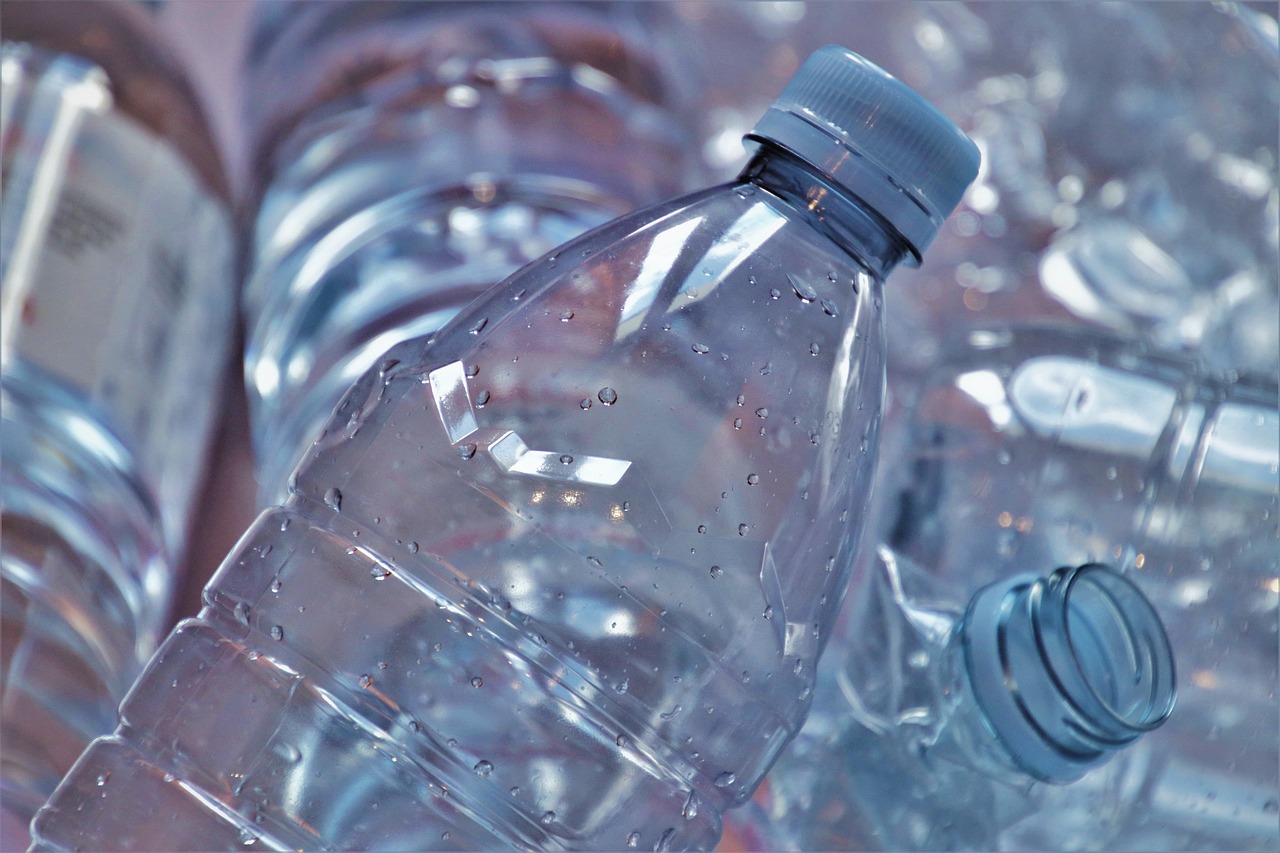
Environmental Benefits
This article explores the various benefits of implementing a bottle deposit scheme, including environmental impact, economic advantages, and community engagement, highlighting why such initiatives are crucial for sustainable practices.
Implementing a bottle deposit scheme is like giving Mother Nature a much-needed hug. These programs play a pivotal role in reducing litter and promoting recycling, which leads to a cleaner, healthier environment. Just think about it: every bottle that gets returned is one less that could end up in a landfill or, worse, in our oceans. This simple act of returning a bottle not only conserves our natural resources but also significantly lowers pollution levels.
When we look at the statistics, it becomes clear how impactful these schemes can be. For instance, areas with bottle deposit programs have seen a reduction in litter by as much as 50%! That's not just a number; it translates to cleaner parks, streets, and waterways. A cleaner environment means healthier ecosystems, which ultimately benefits us all. Imagine walking through a park without the sight of plastic bottles strewn about—it’s a reality we can achieve!
Moreover, these initiatives foster a culture of recycling. When people are incentivized to return their bottles, they become more aware of their waste and its environmental impact. This behavioral shift can lead to broader changes in how communities approach waste management. For example, a bottle deposit scheme can encourage residents to think twice before tossing away other recyclable materials.
Let’s break it down further:
- Less Litter: With a financial incentive to return bottles, fewer containers end up as litter, which helps keep our environments pristine.
- Resource Conservation: Recycling bottles means we use fewer raw materials, saving energy and reducing greenhouse gas emissions.
- Wildlife Protection: Reducing litter helps protect wildlife that can be harmed by ingesting or becoming entangled in waste.
In essence, a bottle deposit scheme is not just about recycling bottles; it’s about creating a sustainable future. By participating in these programs, individuals contribute to a cleaner planet and a healthier community. The ripple effect of these actions can lead to significant environmental improvements, making it clear that supporting bottle deposit schemes is a choice we should all consider.
Q: What is a bottle deposit scheme?
A: A bottle deposit scheme is a system where consumers pay a small deposit on beverage containers, which is refunded when they return the container for recycling.
Q: How do these schemes benefit the environment?
A: They reduce litter, promote recycling, conserve natural resources, and lower pollution levels.
Q: Are there any economic benefits to implementing a bottle deposit scheme?
A: Yes, these schemes can create jobs, boost local economies, and support small businesses.
Q: How can I participate in a bottle deposit scheme?
A: Check your local regulations to see if a scheme is in place, and start returning your bottles to designated locations.

Economic Advantages
Implementing a bottle deposit scheme is not just about saving the environment; it’s also a powerful catalyst for economic growth. Imagine a system where every time you pop open a drink, you’re not just enjoying a refreshing beverage but also contributing to a thriving local economy. That's the magic of bottle deposit programs! These initiatives create a ripple effect that benefits various sectors, from local businesses to job creation in recycling and waste management.
One of the most significant economic advantages of a bottle deposit scheme is its potential to boost local employment. As communities adopt these programs, there is a growing demand for professionals in several areas, including:
- Collection Services: Workers are needed to collect bottles from various locations, ensuring that the materials are returned for recycling.
- Processing Facilities: Facilities that handle the sorting and processing of returned bottles will require staff to manage operations effectively.
- Distribution Networks: With an increase in recycling, logistics and distribution jobs will also see a rise, as recycled materials need to be transported to manufacturers.
Moreover, the introduction of a bottle deposit scheme can lead to a noticeable increase in local business activity. Think about it: when people return their bottles for a refund, they often make a trip to a nearby store or café. This not only benefits the businesses that sell beverages but also encourages customers to shop locally. Increased foot traffic can lead to higher sales, which is a win-win for both the business owners and the community. In fact, small businesses often report a boost in customer engagement and loyalty as they become more involved in sustainability efforts.
Another fascinating aspect of bottle deposit schemes is their ability to stimulate growth in the recycling industry. As the demand for recycled materials rises, businesses that specialize in recycling processes can expand and thrive. This growth can lead to innovations in recycling technologies and practices, making it easier and more efficient to turn waste into valuable resources. With more companies entering the market, competition will drive prices down and improve services, benefiting consumers and the environment alike.
To illustrate the economic impact of bottle deposit schemes, consider the following table that outlines potential job creation across different sectors:
| Sector | Estimated Job Creation |
|---|---|
| Collection Services | 2,000 |
| Processing Facilities | 1,500 |
| Logistics and Distribution | 1,000 |
| Retail (Increased Foot Traffic) | 3,000 |
In summary, the implementation of a bottle deposit scheme serves as a multifaceted approach to economic revitalization. By fostering job creation, supporting local businesses, and stimulating the recycling industry, these programs not only enhance community well-being but also pave the way for a more sustainable future. So, the next time you’re enjoying a drink, remember that your bottle can do more than just quench your thirst; it can also be a stepping stone towards economic growth and environmental stewardship.

Job Creation
Implementing a bottle deposit scheme can be a game-changer for job creation across various sectors. When communities adopt these programs, they not only contribute to environmental sustainability but also open the floodgates to a myriad of employment opportunities. Think about it: every bottle that gets returned is a step towards a healthier planet, and it also means more hands on deck to manage the process. From collection to processing and distribution, the ripple effect of job creation can be significant.
Let's break down some of the key areas where job growth is likely to occur:
- Collection Services: As more people participate in bottle deposit schemes, the demand for collection services increases. This leads to the creation of jobs for drivers and collection personnel who are responsible for picking up bottles from various locations.
- Processing Facilities: Once collected, bottles need to be processed. This means jobs in recycling facilities where workers sort, clean, and prepare these materials for reuse.
- Distribution Networks: After processing, recycled materials need to be distributed to manufacturers. This opens up opportunities in logistics and transportation, creating even more jobs.
Moreover, the introduction of a bottle deposit scheme can also stimulate local economies. More jobs mean more income, which can lead to increased spending in local businesses. Imagine a local diner benefiting from the influx of workers who now have jobs related to the bottle deposit program. This interconnectedness can create a thriving community where everyone benefits from the initiative.
In addition to direct job creation, these schemes can inspire entrepreneurial ventures. Local entrepreneurs might see a niche in providing services related to bottle collection or setting up new recycling businesses. This innovation can lead to a vibrant job market, fostering a culture of sustainability while also addressing unemployment issues.
In summary, the job creation potential of a bottle deposit scheme is vast. By investing in such initiatives, communities not only help the environment but also lay the groundwork for a more robust economy. With every bottle returned, we’re not just recycling; we’re also building a future where jobs are plentiful, and our planet is healthier.
Q: How does a bottle deposit scheme create jobs?
A: Bottle deposit schemes create jobs in various sectors such as collection, processing, and distribution of recyclable materials. Each step in the recycling process requires manpower, leading to increased employment opportunities.
Q: What types of jobs are most commonly created?
Common jobs include collection service personnel, recycling facility workers, and logistics coordinators for distribution networks. Additionally, there may be opportunities for entrepreneurs to start businesses related to recycling and waste management.
Q: Can local businesses benefit from bottle deposit schemes?
Absolutely! Local businesses can see increased foot traffic and customer engagement as more people participate in recycling efforts, leading to a boost in sales and community support.

Recycling Industry Growth
The introduction of a bottle deposit scheme can act as a catalyst for substantial growth within the recycling industry. Imagine a world where every bottle you return not only benefits your wallet but also contributes to a thriving economy. By incentivizing consumers to return their bottles, these schemes create a steady supply of recyclable materials, which in turn fuels the recycling industry. This ripple effect can lead to increased investments in recycling technologies and facilities, ultimately resulting in a more efficient and sustainable process.
As the demand for recycled materials rises, businesses within the recycling sector can expand their operations, leading to a more robust market. For instance, companies specializing in the collection, sorting, and processing of recyclable materials may find themselves needing to hire more workers to meet the growing demand. This growth can also encourage innovation, as businesses seek out new methods and technologies to improve efficiency and reduce costs. The result? A dynamic recycling industry that not only helps the environment but also provides valuable economic opportunities.
Moreover, the establishment of bottle deposit schemes can lead to the creation of specialized recycling facilities. These facilities are designed to handle the influx of returned bottles, ensuring that they are processed correctly and efficiently. This not only helps to reduce the amount of waste that ends up in landfills but also promotes the idea of a circular economy, where materials are reused and recycled rather than discarded. The more we recycle, the less pressure we put on our planet's finite resources, making this an essential step toward sustainability.
In addition, the growth of the recycling industry can create a network of partnerships between local governments, businesses, and community organizations. By working together, these entities can develop comprehensive recycling programs that not only focus on bottle deposits but also on other recyclable materials. This collaboration can lead to increased public awareness and participation in recycling efforts, further enhancing the effectiveness of these initiatives.
To summarize, the implementation of a bottle deposit scheme is more than just a means to encourage recycling; it's a powerful tool for stimulating growth in the recycling industry. By creating jobs, fostering innovation, and promoting a sustainable economy, these programs can have a lasting impact on both the environment and the economy. As we continue to navigate the challenges of waste management and environmental sustainability, embracing initiatives like bottle deposit schemes will be crucial for paving the way toward a greener future.
- What is a bottle deposit scheme? A bottle deposit scheme is a program where consumers pay a small deposit on beverage containers, which is refunded when the container is returned for recycling.
- How does a bottle deposit scheme benefit the environment? It encourages recycling, reduces litter, and conserves natural resources by ensuring that bottles are returned and processed rather than discarded.
- Can bottle deposit schemes create jobs? Yes, they can lead to job creation in areas such as collection, processing, and distribution within the recycling industry.
- Are there any financial incentives for consumers? Absolutely! Consumers receive a refund of their deposit when they return their bottles, providing a financial incentive to recycle.
- How do these schemes promote community engagement? They foster a sense of responsibility among residents, encouraging collective action towards sustainability efforts.

Local Business Support
When we talk about in the context of a bottle deposit scheme, the benefits are both tangible and profound. Imagine a bustling community where local shops thrive, not just because of the products they sell, but also due to the increased foot traffic generated by recycling initiatives. This is precisely what a bottle deposit program can do. By encouraging residents to return their bottles for a deposit, these schemes create a steady stream of customers who might stop by a local café or grocery store on their way to the recycling center.
Furthermore, local businesses can leverage these initiatives to enhance their brand image. By actively participating in sustainability efforts, businesses not only attract eco-conscious consumers but also build a loyal customer base that appreciates their commitment to the environment. For instance, a local coffee shop might offer discounts to customers who bring in their recycled bottles, creating a win-win situation for both the business and the environment.
Additionally, the financial implications of a bottle deposit scheme can be significant for local economies. As more people engage in recycling, the demand for local collection points and processing facilities rises. This can lead to the establishment of new businesses focused on recycling and waste management, thereby creating jobs and stimulating economic growth. Below is a table illustrating the potential economic impact of such initiatives:
| Impact Area | Potential Benefits |
|---|---|
| Job Creation | Increased employment opportunities in recycling and waste management sectors. |
| Increased Foot Traffic | More customers visiting local businesses due to recycling incentives. |
| Brand Loyalty | Businesses can enhance their reputation by participating in sustainable practices. |
| Community Engagement | Local businesses can foster a sense of community through collaborative recycling efforts. |
In conclusion, the connection between bottle deposit schemes and local business support is undeniable. Not only do these programs create a more sustainable environment, but they also drive economic growth and community engagement. When local businesses thrive, the entire community benefits, creating a cycle of support that reinforces the importance of sustainability. So, next time you think about recycling your bottles, remember that you’re not just helping the planet; you’re also supporting your local economy.
- What is a bottle deposit scheme?
A bottle deposit scheme is a program where consumers pay a small deposit on beverage containers, which is refunded when the container is returned for recycling.
- How do bottle deposit schemes benefit local businesses?
These schemes increase foot traffic, enhance brand loyalty, and can lead to job creation in the community.
- Are there any financial incentives for businesses to participate?
Yes, businesses that engage in recycling initiatives often see increased customer engagement and potential cost savings in waste management.
- How can I get involved in a bottle deposit scheme?
Check with your local government or recycling center to find out if a bottle deposit scheme is available in your area and how you can participate.

Community Engagement
When it comes to sustainability, community engagement is not just a buzzword; it’s the heartbeat of any successful initiative. A bottle deposit scheme is a perfect example of how collective action can make a significant impact. Imagine a neighborhood where residents come together, united by a common goal: to keep their environment clean and promote recycling. This sense of community can transform individual efforts into a powerful movement, creating a ripple effect that reaches far beyond the initial intent.
One of the most compelling aspects of bottle deposit schemes is the way they foster a sense of responsibility among residents. When people see that their actions—like returning bottles for a deposit—contribute to a larger cause, they are more likely to participate actively. This participation can manifest in various ways:
- Organized Clean-Up Events: Communities often organize events where residents gather to clean up local parks, beaches, and streets, turning recycling into a social event.
- Educational Workshops: Local organizations can host workshops to educate residents on the importance of recycling and how bottle deposit schemes work.
- Incentive Programs: Some communities offer additional incentives for families or groups that consistently return bottles, creating a friendly competition that encourages more participation.
These activities not only engage community members but also strengthen bonds among them. When people work together towards a shared goal, they build relationships that can lead to further initiatives and a stronger, more connected community. Plus, the visibility of these programs often attracts attention from local businesses and organizations, creating partnerships that can enhance the scheme's effectiveness.
Moreover, community engagement in bottle deposit schemes can lead to increased awareness of broader environmental issues. As residents become more involved in recycling efforts, they often start to think critically about other aspects of waste management and sustainability. This heightened awareness can lead to changes in behavior that extend beyond just bottles. For instance, individuals may begin to adopt more sustainable practices in their daily lives, such as reducing single-use plastics, composting, or supporting local recycling programs.
In summary, community engagement is a vital component of bottle deposit schemes. It transforms individual actions into collective efforts, fostering a culture of sustainability and environmental responsibility. When communities come together, they not only tackle the immediate challenges of waste management but also cultivate a mindset that values the health of our planet. This is why supporting bottle deposit schemes is not just about recycling bottles; it’s about building a better future for all.
Q: What is a bottle deposit scheme?
A: A bottle deposit scheme is a system where consumers pay a small deposit on beverage containers, which is refunded when the container is returned for recycling. This incentivizes recycling and reduces litter.
Q: How does community engagement help these schemes?
A: Community engagement encourages participation and fosters a sense of responsibility among residents. It can lead to organized events, educational workshops, and increased awareness of sustainability practices.
Q: What are the environmental benefits of bottle deposit schemes?
A: These schemes significantly reduce litter, promote recycling, lower pollution levels, and conserve natural resources by ensuring that more bottles are returned for reuse or recycling.
Q: Can bottle deposit schemes create jobs?
A: Yes! The implementation of bottle deposit schemes can lead to job creation in various sectors, including collection, processing, and distribution of recyclable materials.
Q: How can I get involved in a bottle deposit scheme in my community?
A: You can start by checking if your community has a bottle deposit program in place. If not, consider advocating for one by connecting with local environmental organizations or community groups.
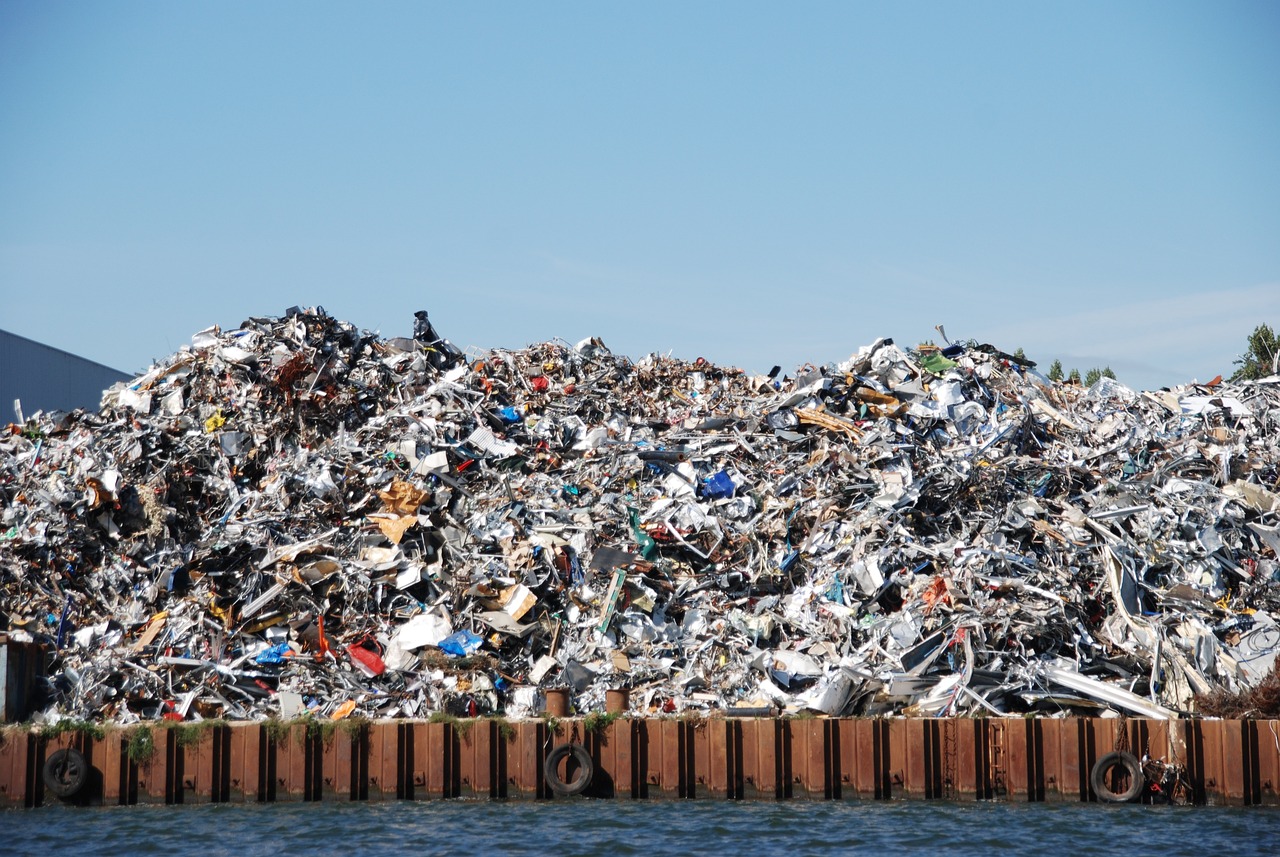
Behavioral Change
Implementing a bottle deposit scheme can lead to significant behavioral changes regarding waste disposal. Imagine walking down the street and seeing a shiny bottle lying on the ground. With a bottle deposit system in place, that bottle isn't just trash; it's a potential treasure! People start to see value in items that were once discarded, which fundamentally alters their perception of waste. This transformation isn't just about picking up litter; it’s about cultivating a mindset that prioritizes recycling and sustainability.
The financial incentives offered by bottle deposit programs serve as a powerful motivator. When individuals know that they can earn a few cents for each bottle returned, the likelihood of them recycling increases dramatically. It's like turning a chore into a game where everyone can win! Studies have shown that places with bottle deposit schemes see recycling rates soar, often exceeding 90% in some regions. This is a stark contrast to areas without such systems, where recycling rates can plummet to below 30%.
Moreover, these programs often come with educational components that raise awareness about the importance of recycling. Communities that implement bottle deposit schemes frequently host workshops and informational sessions to teach residents about the benefits of recycling and how to do it effectively. This educational push can lead to a ripple effect, where individuals not only change their own behaviors but also influence their friends and family. It's a collective awakening towards sustainability!
To illustrate the impact of behavioral change brought about by bottle deposit schemes, consider the following table:
| Region | Recycling Rate Before Scheme | Recycling Rate After Scheme |
|---|---|---|
| Region A | 25% | 95% |
| Region B | 30% | 90% |
| Region C | 20% | 85% |
As seen in the table, regions that have adopted bottle deposit schemes experience a dramatic increase in recycling rates. This not only reduces litter but also conserves natural resources and lessens the burden on landfills. When individuals understand that their actions matter, they are more likely to participate in recycling initiatives, leading to a cleaner and more sustainable environment.
In conclusion, the behavioral changes prompted by bottle deposit schemes are profound and far-reaching. They not only encourage individuals to recycle more but also foster a community-wide commitment to sustainability. When people are rewarded for their efforts, they become more engaged and responsible, ultimately driving a cultural shift towards more environmentally friendly practices.
- What is a bottle deposit scheme? A bottle deposit scheme is a system where consumers pay a small deposit on beverage containers, which is refunded when the container is returned for recycling.
- How do bottle deposit schemes benefit the environment? They reduce litter, promote recycling, conserve natural resources, and lower pollution levels.
- Can bottle deposit schemes create jobs? Yes, they can create jobs in various sectors such as collection, processing, and distribution of recycled materials.
- How can I participate in a bottle deposit scheme? You can participate by returning your beverage containers to designated collection points to receive your deposit back.

Increased Recycling Rates
This article explores the various benefits of implementing a bottle deposit scheme, including environmental impact, economic advantages, and community engagement, highlighting why such initiatives are crucial for sustainable practices.
A bottle deposit scheme significantly reduces litter and promotes recycling, leading to a cleaner environment. This section discusses how these programs contribute to lower pollution levels and conserve natural resources.
Implementing a bottle deposit scheme can boost local economies by creating jobs in recycling and waste management sectors. This section explores the financial benefits for communities and businesses involved.
The introduction of a bottle deposit scheme can lead to job creation in various sectors, including collection, processing, and distribution. This subheading will detail the potential employment opportunities generated.
As demand for recycled materials increases, the bottle deposit scheme can stimulate growth in the recycling industry. This section examines how such initiatives can lead to a more robust recycling market.
Local businesses can benefit from increased foot traffic and customer engagement through bottle deposit programs. This subheading discusses how these schemes can support small businesses in the community.
Bottle deposit schemes encourage community participation in sustainability efforts. This section highlights how these programs foster a sense of responsibility and collective action among residents.
A bottle deposit scheme can lead to positive behavioral changes regarding waste disposal. This section discusses how financial incentives encourage individuals to recycle more consistently.
One of the most compelling reasons to support a bottle deposit scheme is its ability to significantly increase recycling rates. When individuals know that they can receive a monetary reward for returning their bottles and cans, they are much more likely to participate in recycling programs. This phenomenon is not just anecdotal; numerous studies have demonstrated that regions with bottle deposit schemes experience higher recycling rates compared to those without.
For instance, in states that have implemented bottle deposit laws, recycling rates for beverage containers can soar to over 85%. In contrast, areas without such incentives often struggle to reach even 30%. This stark difference highlights the effectiveness of financial incentives in promoting recycling behavior.
Moreover, the benefits of increased recycling rates extend beyond just the volume of materials collected. By diverting bottles and cans from landfills, these schemes help to reduce the overall waste footprint of communities. This not only conserves valuable natural resources but also mitigates the environmental impact associated with waste disposal, such as greenhouse gas emissions and pollution.
To illustrate the impact, consider the following table that compares recycling rates in states with and without bottle deposit laws:
| State | Recycling Rate (%) | Deposit Scheme |
|---|---|---|
| California | 85% | Yes |
| Michigan | 90% | Yes |
| Texas | 20% | No |
| Florida | 25% | No |
This table clearly shows that states with bottle deposit schemes enjoy significantly higher recycling rates. The financial incentive acts as a catalyst, motivating individuals to engage in recycling practices that they might otherwise overlook.
In addition to the direct impact on recycling rates, these schemes also play a crucial role in raising awareness about the importance of recycling. As people participate in the process of returning bottles and cans, they become more conscious of their consumption habits and the waste they generate. This increased awareness can lead to broader changes in behavior, encouraging individuals to adopt more sustainable practices in their daily lives.
In conclusion, the implementation of a bottle deposit scheme is a powerful tool for increasing recycling rates, which in turn fosters a more sustainable environment. By offering financial incentives, these programs not only encourage participation but also spark a greater understanding of the importance of recycling, ultimately benefiting both the community and the planet.
- What is a bottle deposit scheme? A bottle deposit scheme is a program where consumers pay a small deposit on beverage containers, which is refunded when the container is returned for recycling.
- How do bottle deposit schemes benefit the environment? They reduce litter, increase recycling rates, and conserve natural resources by promoting the reuse of materials.
- Are bottle deposit schemes economically beneficial? Yes, they can create jobs in the recycling industry and support local businesses by increasing foot traffic.
- How can I participate in a bottle deposit scheme? Look for participating retailers and collection centers in your area where you can return your bottles and receive your deposit back.

Awareness and Education
When it comes to sustainability, knowledge is power. A bottle deposit scheme can serve as a powerful educational tool, transforming the way communities perceive recycling and waste management. Through these initiatives, individuals are not only incentivized to return their bottles but are also educated about the broader implications of their actions on the environment. Imagine a community where every resident understands how their small actions contribute to a larger movement towards sustainability. This is the kind of change a bottle deposit scheme can inspire.
One of the most impactful aspects of these programs is their ability to raise awareness about the environmental consequences of waste. Many people may not realize that the bottles they toss aside can take hundreds of years to decompose in landfills. By incorporating educational components into the deposit scheme, organizers can inform the public about:
- The importance of recycling for reducing landfill waste
- How recycling conserves natural resources
- The energy savings associated with recycling materials compared to producing new ones
Moreover, educational campaigns accompanying bottle deposit schemes often utilize various platforms to reach a wider audience. Schools, community centers, and local businesses can collaborate to host workshops, distribute informative pamphlets, and even launch social media campaigns. These efforts can create a ripple effect, where knowledge spreads beyond the initial participants, fostering a culture of sustainability.
Furthermore, these educational initiatives can be tailored to different age groups. For instance, younger children can engage in fun, interactive activities that teach them about recycling through games and hands-on projects. On the other hand, adults might benefit from seminars that discuss the economic advantages of recycling and how it can lead to a healthier planet. By addressing the needs of various demographics, the message of sustainability becomes more inclusive and effective.
In conclusion, the educational aspect of bottle deposit schemes goes beyond simple recycling; it instills a sense of responsibility and awareness in the community. As people become more informed about their environmental impact, they are more likely to participate actively in sustainability efforts. This collective understanding and engagement can lead to a significant cultural shift towards eco-friendliness, ensuring that future generations inherit a cleaner, greener planet.
- What is a bottle deposit scheme?
A bottle deposit scheme is a program that encourages consumers to return their beverage containers for a refund, thereby promoting recycling and reducing litter. - How does a bottle deposit scheme benefit the environment?
These schemes significantly reduce litter, encourage recycling, and conserve natural resources, leading to a cleaner environment. - Can bottle deposit schemes boost local economies?
Yes, they create jobs in recycling and waste management, while also supporting local businesses through increased foot traffic. - How can I get involved in a bottle deposit scheme?
You can participate by returning your bottles to designated locations and educating others in your community about the benefits of these programs.
Frequently Asked Questions
- What is a bottle deposit scheme?
A bottle deposit scheme is a system where consumers pay a small deposit on beverage containers, which is refunded when the container is returned for recycling. This encourages recycling and reduces litter in our environment.
- How does a bottle deposit scheme benefit the environment?
These schemes significantly reduce litter and promote recycling, leading to a cleaner environment. They help lower pollution levels and conserve natural resources by ensuring that bottles are recycled rather than ending up in landfills or oceans.
- Can a bottle deposit scheme create jobs?
Absolutely! Implementing a bottle deposit scheme can lead to job creation in various sectors, including collection, processing, and distribution of recyclable materials. This not only boosts the economy but also supports local communities.
- How does it support local businesses?
Local businesses can benefit from increased foot traffic and customer engagement through bottle deposit programs. As more people return bottles, they often visit nearby stores, creating a win-win situation for both the community and the economy.
- What kind of behavioral changes can we expect?
Financial incentives from bottle deposits encourage individuals to recycle more consistently. Over time, this can lead to positive behavioral changes regarding waste disposal, fostering a culture of sustainability within communities.
- Are there any educational components to these schemes?
Yes! Many bottle deposit schemes include educational initiatives that raise awareness about recycling and sustainability practices. This helps inform the public about the importance of their participation in these programs.
- How do bottle deposit schemes impact recycling rates?
Statistical data shows that bottle deposit schemes can significantly increase recycling rates. By providing a financial incentive, individuals are more likely to return their bottles for recycling rather than discarding them.
- Can these schemes help reduce pollution?
Definitely! By encouraging the recycling of bottles and reducing litter, bottle deposit schemes contribute to lower pollution levels in our environment. This leads to cleaner streets, parks, and waterways.


